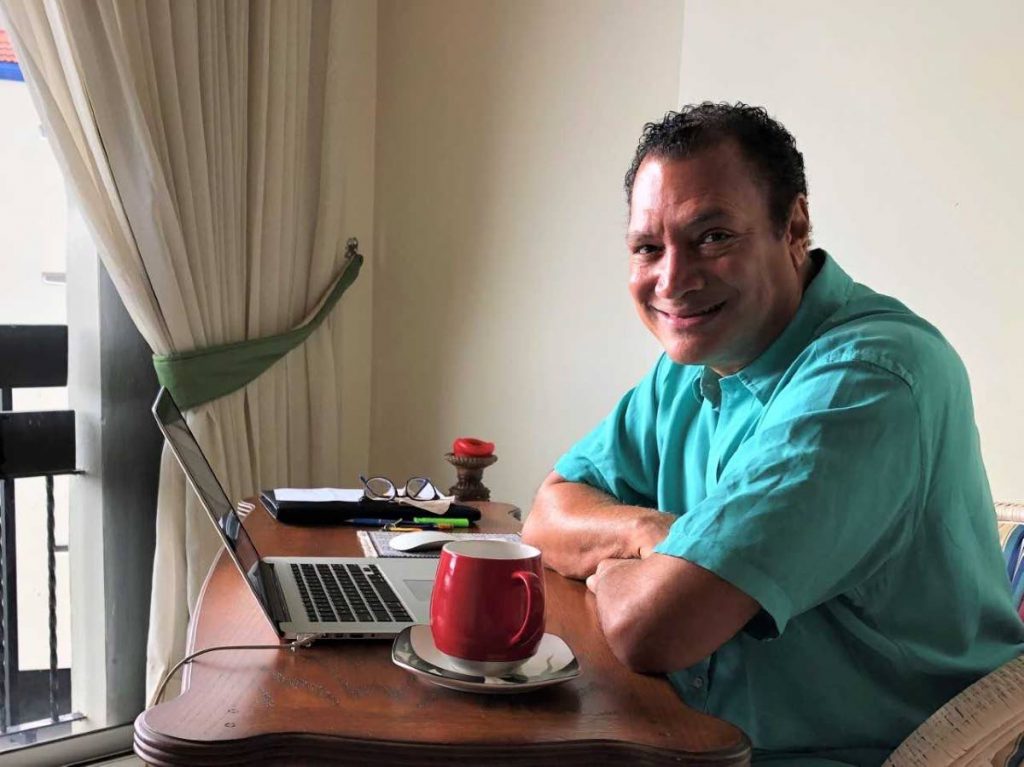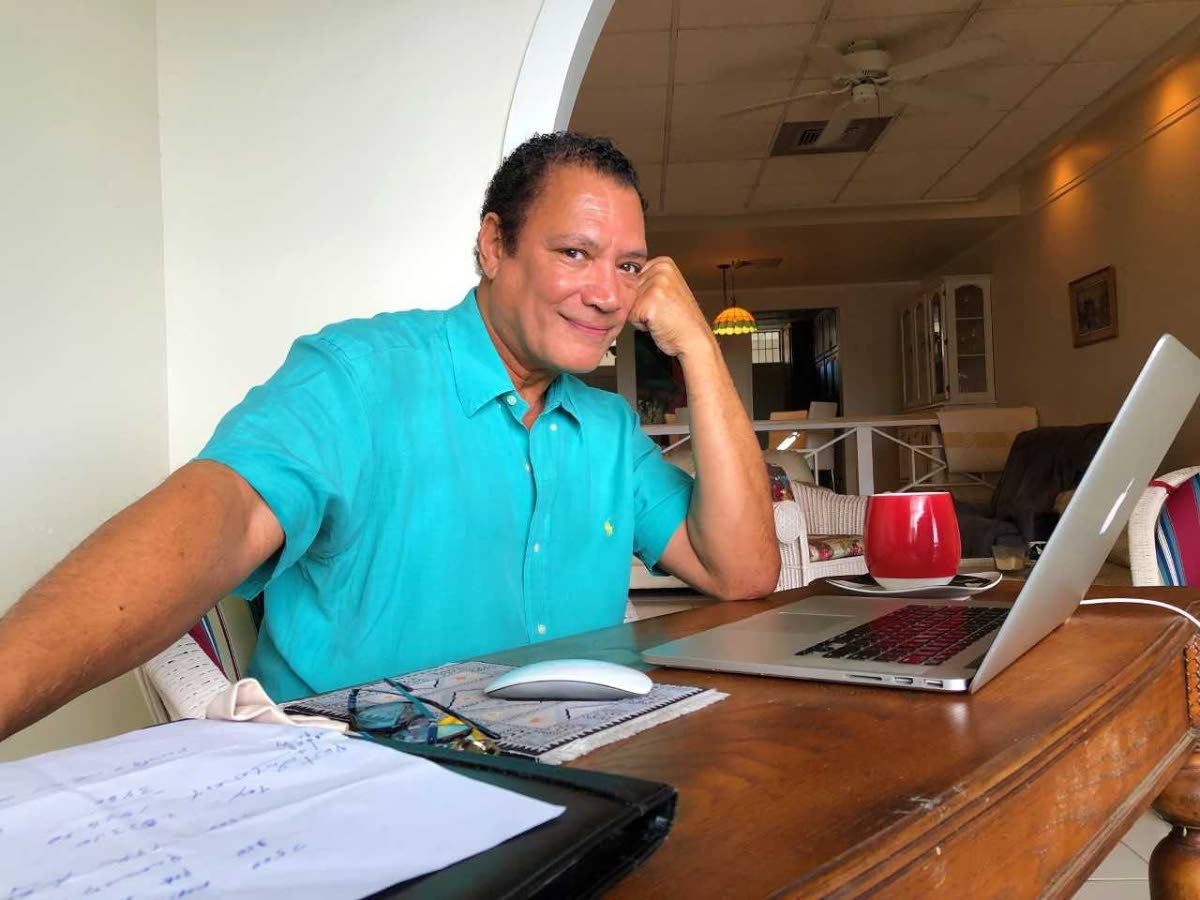At a crossroads, again

LISA ALLEN-AGOSTINI
AFTERNOON sunshine streams onto the Diego Martin balcony where American playwright and director Ricardo Khan sits at his computer. It’s a mid-January day. The soft hills in the background are a breathless green. Asked to read some of what he’s been writing since he got to Trinidad on Christmas Day, Khan picks something on the theme “crossroads”.
It’s no surprise. He co-founded Crossroads Theatre Co in 1978 and was its artistic director until 2009. In November 2019, when it reopens in a new space, he is set to return to the company as artistic director emeritus. A New Jersey institution, Crossroads premiered many plays by noted African-American writers including Ntozake Shange, George C Wolf, Ruby Dee and Anna Deavere Smith. Joseph Papp cited it as one of his favourites; August Wilson called it a role model for black theatres.
In 2000, when Khan came for his last sabbatical in TT, Crossroads had just won a Tony Award for Outstanding Regional Theatre.
“I had spent 20 years running this company. We were the largest black theatre in America. To receive the award that credited us as the top theatre, period, in America, I felt where do I go from here? And most importantly, how can I enter into dialogue about race in America in a different way? It was almost impossible while I was in America. Everybody was saying the same thing.
“I thought if I spent the year in Trinidad it would give me a different perspective on it. I wanted to come to a place where culture was first before race.”
Khan’s father, Mustapha, was from New Grant; he sailed to America in the 40s and enrolled in Howard University, where he took a medical education and an African-American wife, Jacqueline. Ricardo Mohamed Khan – Rick, he calls himself – was born in Washington, DC, on November 4, 1951.
He came to Trinidad the first time as an eight-year-old boy with his family. He recalls feeling no difference between himself and his Indo-Trini cousins. “My father is of Indian descent but we never saw my father as anything but black. And I don’t think he did either.”
Khan is flush with the success of Fly, a play on the Tuskegee Airmen he co-wrote and directed. Khan’s maternal cousin, Elwood T “Woody” Driver, was an Airman, and another Airman, George Bolden, was a family friend. Seeing a photo of the black squad of pilots shocked and inspired him and he began to research the topic extensively.
The squadron predated the desegregation of the US Armed Forces. Who were these black men who flew fighter jets during the days of Jim Crow, he wondered.
Khan wrote Fly with Trey Ellis, who had previously written The Tuskegee Airmen, an award-winning HBO bio pic. Ellis wrote most of the dialogue in Fly, Khan said.
At Crossroads, Khan had worked on a piece on the Airmen, Black Eagles, by playwright Leslie Lee.
The first version of Fly was commissioned in 2005 by the Lincoln Center Institute, where Khan was artist-in-residence. It was meant to be a one-hour play to tour schools.
Khan said Fly is visceral, “an experience that kind of surrounds you in the theatre.” It combines stage acting with video screens, and the emotional narration is done in tap dance.
“Realising what is it that young people connect with visually, I originally conceived Fly through the eyes of a video game. Hip-hop was also a big way to connect with young people. I thought there’s so much in that story that could not be told in words so I used a hip-hop tap artist to tell the parts of the story that words could not.”
The play changed after a surviving Airman gave Khan input for historical veracity. It changed again after US President Barack Obama had the Airmen as his guests at his inauguration. The event is now part of the play.
“They had so much to do with the doors opening through the years. They predated Rosa Parks, the Civil Rights Movement and Emmet Till, so now here they were being honoured and I’m thinking about Obama: during his years there must have been a lot he could not express. He needed a tap griot to tell the story you can’t tell with words.”
His most recent staging Off-Broadway cleaned up at the NAACP Theatre Awards last year, earning eight nominations and winning best production, best lighting and best choreography.
In November, Khan left his ten-year position as visiting professor in the graduate theatre programme at the University of Missouri in Kansas City. His next project, with Lincoln Center in New York, has not yet begun. In the interim, it is the perfect time for him to take a sabbatical. Again, he came to Trinidad. This time he’s here for six weeks.
His first aim was to edit a collection of his own plays for publication. He has four: Fly, Satchel Paige and the Kansas City Swing, Sheila’s Day, and Freedom Writers.
His second aim was to write a history of Crossroads.
“The goal for Trinidad was to get away” to a place that “feeds” him, he said. At Crossroads he pioneered the practice of associate artist residencies, supporting top playwrights with an “artistic home.” This provided housing and development costs while they created work. “That is what really put us on the map and made us who we were as a company. I don’t design a season of plays, I design a season of people. It may take years from the beginning of it.”
That’s the lightning he’s trying to bottle.
“When you say you need an artistic home it needs to be away from where you are, in order for you to find your most daring self.”
It’s planned as a collection of anecdotes wrapped around eight to ten of the most significant plays the company debuted over the years.
“Maybe I shouldn’t say the history of Crossroads. It’s the story of Crossroads. When I look back on it, I look back on it in terms of what was happening in my life, in so-and-so’s life.”
The African-American experience is embedded in Khan’s work. “As a black person in the States, in order to survive both commerce and culture you have to know how to speak and move in a white world in such a way that your blackness will not be a distraction from who you are inside. In your own black world, you have to be able to forget all the tricks and contortions you go through so you can come back and be yourself. This is a fractured lifestyle. I don’t know anybody I’ve ever worked with who hasn’t been able to master that in some way. We know more about white people in America, as black people, because we’ve had to learn their stuff in order to survive.”
However, he added, “We sometimes put too much attention on what I can refer to as cultural territorialism, where we say this is mine, I am different from you, this is my culture not yours. And while I’m an absolute warrior for knowing our cultural roots, I’m also a warrior for the rights of young people to define themselves and their future in a whole different language than we know.
“I am not about saying this is where we should go. Truth be told I don’t even know where we are now.” But, he adds, “If you’re more concerned with race than the opioid epidemic, you’re missing the point.”


Comments
"At a crossroads, again"